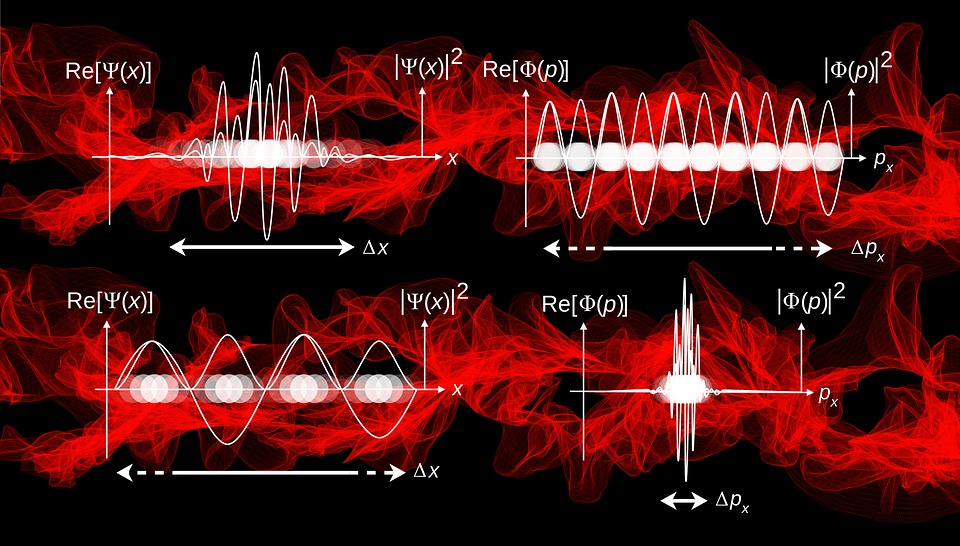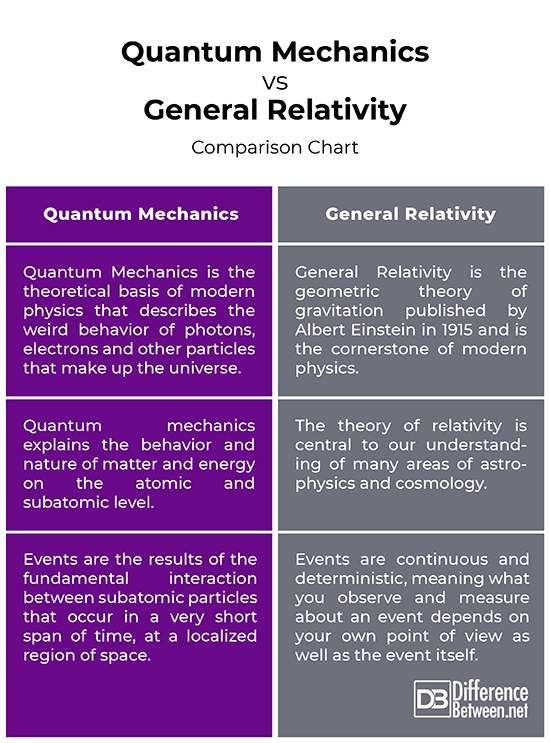Difference Between Quantum Mechanics and General Relativity
Modern physics is founded on the two very important discoveries of the last century: Quantum Mechanics and General Theory of Relativity. In fact, both of these theories form the very foundation of the current understanding of physics – and yet the two don’t seem to work together. Physicists have spent years trying to reconcile these two theories and bridging the gap between the two. Both the theories were developed to deal with the major failings of Newtonian physics. These two theories have radically changed our perception of what objects ought to be and how they ought to behave.
There is the General Theory of Relativity which was published by Albert Einstein in 1915 and is the major building block of modern physics which provides a synthesis of special relativity and gravitation. This is central to our understanding of many areas of astrophysics and cosmology. Then there is Quantum Mechanics, which explains the nature of matter and energy on the atomic and subatomic level. It deals with the behavior of photons, electrons and other particles that make up the universe. Both are fundamentally very different theories with different formulations.
What does Quantum Mechanics means?
Quantum Mechanics is the theoretical basis of modern physics that describes the weird behavior of photons, electrons and other particles that make up the universe. The introduction of quantum mechanics was prompted by the failure of classical physics in explaining a number of microphysical phenomena that were observed at the end of nineteenth and early twentieth centuries. The branch of physics that studies the structure and motion of atoms is known as quantum mechanics. It is one of the most important areas of modern physics which aims to describe the properties of molecules and atoms and their constituents. Simply put, it is the physics that explains how everything works.
What is General Relativity?
General Theory of Relativity, or General Relativity, is one of the cornerstones of classical physics, which provides a synthesis of special relativity and gravitation. The theory of relativity is central to our understanding of many areas of astrophysics and cosmology. General relativity fundamentally changed our ideas of space and time. According to relativity, objects cannot be in two different states at the same time. But the problem here is the phrase ‘at the same time.’ Time itself now becomes a relative concept, dependent on the observer. Relativity means that what you observe and measure about an event depends on your own point of view as well as the event itself. The theory of relativity is the geometric theory of gravitation published by Albert Einstein in 1915.
Difference between Quantum Mechanics and General Relativity
Theory of Quantum Mechanics Vs. General Relativity
– Both the Einstein’s Theory of Relativity and Quantum Mechanics form the very foundation of the current understanding of physics and yet resolving the differences between the two remains a huge challenge. The premise on which Einstein’s theory of relativity is based is that the speed of light, and all electromagnetic radiation, is always the same, regardless from what point of view it is measured. Quantum Mechanics is one of the most important areas of modern physics which strives to describe the properties of molecules and atoms and their constituents.
Events
– In the Einstein’s Theory of Relativity, events are continuous and deterministic, meaning what you observe and measure about an event depends on your own point of view as well as the event itself. Observations are relative to the frame of reference of the observer. An event is simply an occurrence at some specific time and at some specific place. Events form the basic elements of the space-time description of universe. In quantum mechanics, events are the results of the fundamental interaction between subatomic particles that occur in a very short span of time, at a localized region of space.
Quantum Mechanics vs. General Relativity: Comparison Chart
Summary of Quantum Mechanics Vs. General Relativity
Both the General Theory of Relativity and Quantum Mechanics are fundamentally very different theories with different formulations. In fact, the two very important theories form the very foundation of the current understanding of physics and yet the two don’t seem to work together. The General Theory of Relativity implies that the laws of nature are totally deterministic. Here, ‘determinism’ refers to all predetermined aspects of a closed system, coupled in a totally objective way that is independent on measurements that may or may not be carried out. Quantum mechanics, on the other hand, is the cornerstone of all modern physics: molecular, solid state, atomic, nuclear, optics, thermodynamics, statistical mechanics, and so on. Physicists have spent years trying to resolve the differences between the two theories which remain a huge challenge till now.
- Difference Between Caucus and Primary - June 18, 2024
- Difference Between PPO and POS - May 30, 2024
- Difference Between RFID and NFC - May 28, 2024
Search DifferenceBetween.net :
Leave a Response
References :
[0]Image credit: https://commons.wikimedia.org/wiki/File:Electromagnetism_and_General_Relativity_as_Entropy.png
[1]Image credit: https://cdn.pixabay.com/photo/2016/07/18/07/39/quantum-mechanics-1525470_960_720.jpg
[2]Fleisher, Paul. Relativity and Quantum Mechanics: Principles of Modern Physics. Minneapolis, USA: Lerner Publications Company, 2001. Print
[3]Dunningham, Jacob and Vlatko Vedral. Introductory Quantum Physics and Relativity. Singapore: World Scientific, 2018. Print
[4]Hobson, M.P. et al. General Relativity: An Introduction for Physicists. Cambridge, United Kingdom: Cambridge University Press, 2006. Print
[5]Zettili, Nouredine. Quantum Mechanics: Concepts and Applications. Hoboken, New Jersey: John Wiley & Sons, 2009. Print
[6]Gottfried, Kurt and Tung-Mow Yan. Quantum Mechanics: Fundamentals. Berlin, Germany: Springer, 2013. Print
[7]Sachs, M. Quantum Mechanics from General Relativity: An Approximation for a Theory of Inertia. Berlin, Germany: Springer, 2012. Print



